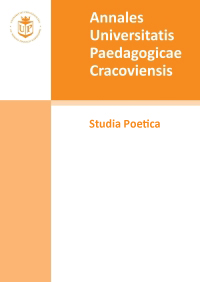Między istotnością dzieła a konkretyzacją czytelniczą ucznia... Miejsce teorii literatury w szkolnym kształceniu literackim (zarys problemu)
Between the sense of work and students’ reading concretisation. The significance of theory of literature in school education of literature (the outline of problem)
Author(s): Zofia Maria Budrewicz SienkoSubject(s): Studies of Literature, Sociology
Published by: Wydawnictwo Uniwersytetu Komisji Edukacji Narodowej w Krakowie
Keywords: theory of literature;structuralism;poetics of reception;hermeneutics;poetics;of experience;post-humanism
Summary/Abstract: The article depicts a synthesis of views on the role and significance of theory of literature in school practice of reading from the interwar period to contemporary times. It consists of three parts. In the first one the authors discuss the view of S. Skwarczyńska who sees theory of literature as fundamental in developing the analytical and interpretative skills of high school students. A reflection of textual reality in reader’s consciousness depends on the sense of literary work and its concretisation (or individuality, which is independent from reader’s perception). This view (and other scholars’ beliefs) did not solve more difficult issues, such as how to combine the analysis of the work structure with the involvement of student’s emotions. In later stages of the development of didactics of literature, the rift between the methods of text interpretation and theory of cognition, the aim of which is an aesthetic experience, did not offer satisfying methodological solutions.In the second part of the article the authors discuss a variety of methods serving to “improve”/modify the structural concept (of B. Chrząstowska), retaining its most significant elements: systematisation and organisation of students’ literary experience. These activities were inspired by new trends in the development of humanities thought (hermeneutics, cultural theory of literature, anthropology, poetics of experience). They recognize the primacy of reading over poetics, and interpretation over theory of literature which is given an important, anthropo-cognitive role. One of such proposals, which was fully used in I like it!, the series of course books (of Z.A. Kłakówna and others) designed for all levels of school Polish language and literature education, was discussed in the third part of the article.The place of theory of literature in the system of science of literature was changed over many years; as a result, its role in school education decreased. Contemporary didactic discourse demonstrates the complexity of the problem but it does not solve it unambiguously. It does not offer a “readymade” knowledge on the universal order of analytical and interpretation practices, but it obligates Polish philology teachers to be creative and to search for best solutions for their students. As such, it requires a professional philological preparation during the time of studies.
Journal: Annales Universitatis Paedagogicae Cracoviensis. Studia Poetica
- Issue Year: 5/2017
- Issue No: 1
- Page Range: 15-36
- Page Count: 22
- Language: Polish

